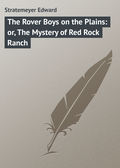
Stratemeyer Edward
Marching on Niagara: or, The Soldier Boys of the Old Frontier
CHAPTER XIX
DEFEAT OF THE ENGLISH
The explosion of the musket had been so unexpected that for the moment Dave and Henry hardly knew what had happened. Dave felt something hit him on the bottom of his left cheek and putting up his hand withdrew it covered with blood. Henry, too, was hit by a flying fragment of the gun barrel which clipped off a lock of his hair. Poor Barringford lay like one dead.
Before Dave could recover the Indians were on them, whooping as if their very lives depended upon it. One threw a tomahawk at Dave, but the aim was poor and the weapon buried itself in the log which had sheltered our friends.
But just at this moment, when all seemed lost, the battleground shifted and instantly thirty or forty English red-coats burst from the woods directly behind the Indians. A volley rang out and four of the redmen pitched forward, shot through the back. Other bullets hit the log behind which our friends lay, but Dave, Henry, and Barringford were not touched.
Attacked so unexpectedly from a new quarter, the Indians appeared dazed. They attempted to turn upon the English soldiers, but when two more were laid low, they fled to one side, where there was a dense growth of walnuts. The soldiers at once made after them, and another skirmish took place in the forest.
"Are you hurt much, Sam?" asked Henry, when he had recovered sufficiently to speak.
"I – I reckon not," was the gasped-out answer, after a long silence. Barringford opened his eyes and gazed ruefully at the gun stock which lay at his feet. "Busted! Well, by gum! Didn't think Old Trusty would do it nohow. Ain't ye ashamed?" And he shook his head dolefully. He had carried the firearm for many years, as our old readers know, and to have it "go back on him" like this hurt him more than had the explosion.
"It singed your beard pretty well," said Dave. "You can be thankful it didn't blow your face to pieces."
"We must get out of here!" cried Henry. "See, the French are coming!"
Henry was right, the French column had suddenly appeared on the brow of a neighboring hill. Those of the English who were in view received a galling fire and then the enemy came forward with a rush. Our friends were glad enough to retreat, and join the main body of rangers once more.
Unfortunately for the English, Major Grant had divided his force and now as the French commander came on he ordered that the smaller of the English commands be surrounded. This was done, and though Major Grant did his best to bring his command together again, it was impossible to do so. The English became hopelessly separated, and by the time the fighting came to an end the major and a large number of his officers and men were made prisoners.
"We are catching it and no mistake," panted Dave, after another stand had been made, during which Barringford had provided himself with another gun – one taken from the hands of a dead grenadier. "The French mean business."
"Here they come again!" exclaimed Henry. "Look! look! they seem to have re-enforcements!"
Henry was right, and it must be admitted that the attack of the French, with the Indians on the left flank, was a superb one. The shock of the two armies coming together was terrific, and soon hand-to-hand encounters were taking place in hundreds of places at once. Guns and pistols rattled constantly and the keen frosty air of late fall was filled with smoke. The grass being wet with dew many slipped and fell and not a few soldiers were trampled to death by frightened horses. It was a scene not easily forgotten and reminded Dave strongly of that other battle when General Braddock had suffered bitter defeat and death.
And bitter defeat was again to be the portion of the English. Major Grant's force was not strong enough to resist the combined onslaught of French and Indians, and at last word came to retreat, and in the gathering darkness the English fell back, taking with them a number of their wounded. How many of the wounded were left on that cold battlefield to die from exposure will never be known. Snow was now falling and a wind came up that chilled every soldier to the bone.
"It's another Braddock victory," said Barringford, sarcastically, as he limped painfully along, a horse having stepped on the toes of his left foot. "Them reg'lars don't understand fightin' in the woods nohow. Ye hev got to fight Injuns Injun fashion, an' French likewise. 'Twon't do no good to set yerself up like a target to be shot at."
"We have lost about three hundred men, killed, wounded and captured," said Dave. "I wonder what General Forbes will say to that?"
"I fancy he's too sick to say much," said Henry. He spoke thus for General Forbes had been on a sick bed for several weeks and had had to be carried forward on a litter whenever his command moved.
The news that Major Grant's command had been whipped and driven back, and the major and many of his officers taken prisoners, was quickly sent to General Forbes, and at once a council of war was held. It was decided that the entire army should be sent forward without delay, and the soldiers moved onward as rapidly as the state of the road permitted. By the time the re-enforcements arrived the French and Indians had retreated to Fort Duquesne, for additional ammunition and general supplies, and to take care of their wounded and prisoners.
Once again Washington urged that a swift march be made on the fort. "It is our only chance of success," he said. "In a few weeks winter will be on us and then the campaign in this wilderness must come to an end."
There was no disputing his words, for the snow continued to fall and when it did not snow it rained and the wind kept growing colder and colder every day until even the most hardy of the soldiers began to grumble over the discomforts of camp life. Forward went the whole army, toiling painfully through the forest, where only an imperfect Indian trail led the way. General Forbes was now weaker than ever and others urged him to go back. But, full of determination, he refused, and continued to direct the movements of his army from his sick bed. His devotion to duty was wonderful and something well worthy of being remembered.
Dave and Henry suffered with the other soldiers. Frequently when night came they had to rest in clothing that was soaked through and through, and the one grain of comfort they extracted from their situation was the thought that each day's march brought them so much nearer to the spot where they supposed little Nell was being kept a prisoner.
"I won't complain if only we get her back," said Henry. And Dave agreed heartily.
It was now the middle of November, and winter had begun to set in in earnest. Ice was forming on every pool and slow-running brook and snow storms were frequent, although none of them amounted to much. The nights were the worst and many a large camp-fire did the soldiers build to keep themselves warm. An advance guard was out constantly, to guard against a surprise, but no French or hostile Indians appeared.
Late one afternoon there were a number of shots fired in the distance and half an hour later a small vanguard came in bringing with them a number of French and Indian prisoners. These prisoners were closely questioned and from them it was learned that the French and Indians at the fort were suffering greatly from sickness and from a lack of supplies, – the latter having failed to reach Fort Duquesne on account of the English victories in the north.
"If you hurry you may take the fort with ease," said one of the prisoners, who wished to curry favor with his captors.
This news was most encouraging and it was ordered that the main body of soldiers should push on again, leaving the artillery and supply wagons to come up later. The news placed Dave and Henry in the best of spirits, and they pushed on as quickly as anybody, with Barringford beside them.
But progress was slow, for there were many hills to cross, and on retreating the French had left many fallen trees in the pathway, and in one spot was a dangerous pitfall, into which the enemy had thrown several wolves. A couple of grenadiers fell into this pitfall and were sadly bitten by the half-starved beasts before being rescued.
At last those in advance reckoned that they were now but one day's journey from Fort Duquesne. The ground looked familiar to Dave and presently Barringford pointed out the spot where the young soldier and his father had been re-united after the battle under Braddock.
Soon from a distance came a hurrahing, which every instant increased in volume. "The fort is deserted! The French and Indians are retreating!"
"Can that be possible?" burst from Henry's lips. "Come, let us find out!"
He rushed forward, and Dave and Barringford quickly followed. Soon they were in the vanguard, which was scrambling over fallen trees and brushwood and climbing the last hill which separated the English soldiers from the fort. There was a thick smoke ahead and presently they saw a column of flame shoot up, followed by a dull explosion.
"They have fired the fort," said Barringford. "Reckon as how they'll burn everything they can't carry."
By the time the soldiers reached the vicinity of the stronghold the fire was burning low. Only a small portion of the stockade was gone, with one or two small buildings and what had been left of the stores. An Indian was found nearby, suffering from a broken leg, and he gave the intelligence that the French command had retreated down the Ohio. Some had gone only a few hours before and others had left three days previous.
"And what of the prisoners they had?" asked Henry, as soon as he could get the chance.
"The prisoners were taken away three days ago."
"Were there any little girls among them?"
"Yes, four little maidens. One from the south and three from the east, with two women and forty-one men," was the reply.
"Three girls!" murmured Henry. "One of them must have been Nell! And they took them off three days ago? Oh, Dave, I'm afraid we have lost her forever!"
CHAPTER XX
AT FORT PITT – RETURN HOME
Dave could do but little to comfort his cousin and if the truth be told he felt almost as sad as Henry, for little Nell, with her bright ways and sweet disposition, seemed more dear to his heart now than ever.
"It's certainly too bad, Henry," he said, after the interview with the Indian had come to an end. "We might follow down the Ohio, but if they have three days' start there is small hope of our catching up. They'll think the English soldiers are after them and they'll push ahead just as hard as possible."
"Do you think General Forbes or Colonel Washington will go after them?"
Dave shook his head.
"No, General Forbes is too sick and winter is now at hand. He is certain to rest on his laurels."
So it proved. A small detachment was sent down the Ohio, and with this went our young soldiers and Sam Barringford. But this detachment returned to the fort three days later, having captured but three Indians and one French trader, all of whom were found in a canoe too intoxicated to make good their escape.
The trader thus taken was named Varlette. He had once been attached to Jean Bevoir's trading post. Dave knew the man, having met him when out gunning with Barringford.
From Varlette they gained the information that Jean Bevoir had been at Fort Duquesne, having come in after the raid upon the homes of the Morrises, Uriah Risley and others. Some of Bevoir's bloodthirsty acts had been discountenanced by the French general in authority, and in something of a rage Bevoir had taken himself off, with his Indian followers and their prisoners.
"Now it ees for him to become von vite chief of de Indians," said Varlette. "Dat will suit heem, and will bring heem in von pot of money, for he vill make de vite peoples pay heem big money for de prisoners."
"The contemptible rascal!" cried Barringford. "Ef the rangers git holt o' him they'll hang him higher nor the tail o' a kite, hear me!"
"He'll deserve hanging, if he misuses little Nell and the others," returned Henry.
As soon as it was possible to do so, the fort was put in thorough repair, and the name was changed to Fort Pitt, in honor of the prime minister of England. To-day this ground is covered by the city of Pittsburg, with its gigantic iron and steel works. What a mighty change from the lonely forest lands of less than a hundred and fifty years ago! Then called the West, or the Western Country, Pittsburg is now considered in the East. So has our country grown.
The fall of Fort Duquesne brought to a close the campaigns of 1758. The taking of this stronghold was hailed with delight by all the settlers in this section of the colonies, and they hastened to re-possess themselves of the homesteads which they had been forced to abandon during the two or three years previous.
As soon as the victory at Fort Duquesne assured peace upon the frontier for some time to come, Washington retired from the colonial troops and returned to Mount Vernon, to the large estate left by his brother, and which now demanded his attention. It may be added here that soon after this he married Mrs. Custis, afterward known to all as the gentle and loving Martha Washington. This was Washington's last appearance on the scene of battle during the French and English War. When next he took up the sword it was for American Independence.
It was not until early spring that Dave and Henry were released from duty and marched with a number of the militia back to Winchester. Their coming was hailed with delight by Mrs. Morris and the others, although all were downcast at the news that little Nell was still missing.
It was found that Joseph Morris was doing nicely and that Rodney was feeling better than ever. James Morris had been out to the homestead and had already cut the timber for another cabin, to take the place of that burned down.
"I also rounded up the most of our cattle and have all our horses and a new lot of chickens and pigs," said he. "So, although we have lost a good deal, we are not as bad off as we might be. The worst loss is the furniture we brought here when we came, years ago. That came from England and Germany and can't be replaced. But I'm reckoning on getting a few fancy pieces for sister Lucy from Annapolis, so things will look kind of homelike after awhile."
"Oh, James, you are very good!" cried Mrs. Morris. "But it won't be home until Nell comes back to it."
A few weeks later found all the Morrises at the homestead, if such the spot can be called. The burned place had been carefully cleaned off by James Morris, and a temporary shelter had been made of a new cattle shed. Here the family went to live while the men and the boys began the construction of the new cabin. Rodney could not do such hard work but kept himself busy with the cattle and the poultry; and thus several weeks passed swiftly away.
Carpenter work pleased Dave and he was set at work making doors and window frames, and also several benches and a table or two, while the others attended to the raising of the cabin frame and the roofing and side boarding. Soon the cabin was fit for use and they moved in, and then Mr. James Morris made several trips to Winchester and one to Annapolis, taking Henry along, to buy the hundred and one things which were needed and which had either been burnt up or carried off by the Indians and their French allies. In the meantime Mrs. Morris busied herself in weaving a new rag carpet and toweling, and in making some necessary clothing, for to buy many of these things was, in those days, out of the question. Then Dave and Henry went hunting and brought down several deer and a number of rabbits and foxes, and once, when out with Sam Barringford, all three brought down a bear, and these skins were all properly tanned and then used for bed coverings and rugs.
On his return from Annapolis James Morris brought news of a new campaign against the French.
"We are going in for the entire conquest of Canada," he said. "Major General Amherst has been put in command of all the British forces, and the army is to be divided into three parts, one under Wolfe against Quebec, another under Amherst himself against Ticonderoga and Crown Point, and a third under General Prideaux, who is to march against Fort Niagara."
"Hurrah!" shouted Henry, "I hope we take Niagara. If we do it will cut the French entirely off from the Ohio and the Mississippi, and this ground will be safer than ever."
"Is Fort Niagara on the Niagara River?" questioned Mrs. Morris.
"It's located on the eastern bank of the river, just where that stream flows into Lake Ontario," replied her husband. "I understand it's a first-class stronghold – a good sight better than Fort Duquesne was. General Prideaux will have no fool of a task reducing it."
"I don't see how he's going to get there, unless he starts from Fort Duquesne and fights his way through the Indian lands," said Rodney. "If he tries that he'll certainly have his hands full."
"No, he's not to go that way," was James Morris's answer. "He's going up to Albany first and from there through the Mohawk valley to Oswego. At Oswego, if everything is favorable, he will take his way westward to Fort Niagara. They didn't say so, but I think he'll go by water from Oswego to Niagara. If he had the boats it would be the safest and quickest route."
"Is he going to take any rangers along?" questioned Dave, eagerly.
"Why, Dave, do you want to become a soldier again?" asked his father, turning to study his son's face.
"Yes, sir," was the prompt response. "I'll tell you why. So long as Canada remains unconquered just so long there is going to be trouble here and elsewhere. But once we show the French we are masters in America we'll have no further fuss, either with them or with the Indians. I go in for settling the matter, and doing it thoroughly and right away, too."
"Gallinippers!" ejaculated Barringford, who stood by, oiling up his flint-lock musket. "Dave, you're a reg'lar lawyer, hang me ef ye ain't! An' the argyment's right to the p'int, too. The Frenchers won't know they're beat until we lick 'em good an' hard, an' I go in fer doin' the lickin' right now. Then, arfter it's done, we kin set out an' plow, an' raise cattle, an' hunt an' trap in peace, – an' the Injun who wants to raise a sculp every ten minits now will sit on a tree stump an' smoke his pipe an' look on," and Barringford shook his head earnestly. "Ain't no ust to talk," he went on. "It's like damming a stream – you dam it about half tight an' the fust lively rain will break the dam to bits; but you dam it good an' hard an' it will stick, no matter how hard it rains and by-an'-by the water will find out it's got to go a new way – an' the French an' Injuns will find they've got to leave the English alone. I ain't much on eddication, but I kin figger thet out, an' so kin any man whose head is level;" and Barringford resumed his gun oiling.
James Morris had much to tell that night – of his many purchases, and of the war talk he had heard at Annapolis and other cities he had visited. He, too, was interested in the expedition against Fort Niagara, for he felt that if the French power was broken in this direction he would be able to return to his trading post on the Kinotah without much fear of molestation from either French or Indians.
It was late that night when there came a sudden thumping on the cabin door. All sprang to their feet in alarm, and each of the men and the boys reached for his firearm, which they were in the habit of having close at hand.
"Who is there?" demanded James Morris.
"It is I – Uriah Risley," came in the well-known voice of the Englishman. "Let me in. I've good news."
At once the cabin door was unbarred and flung back. All crowded forward, to behold Uriah Risley outside, on horseback. Beside him, also on horseback, was his wife, pale and thin, a mere shadow of her former self, but still able to ride alone.
"Well, I declare, Caddy Risley!" screamed Mrs. Morris, and ran out to greet the woman. "Is it really you or your ghost?"
"'Tis really me," was the answer, "although I sometimes feel like a ghost, I'm that thin."
"But mercy on us! Where have you been – with the Indians?"
"With them and with the French. I was with the Indians first – for many weeks – and then some French soldiers rescued me. They turned me over to some traders just before a battle with the English, and then the Indians and some French under Jean Bevoir got hold of me. They took me up through the Mohawk valley to Lake Ontario, and there I met a lot of other prisoners, your Nell with them."
"Nell!" the name came from several lips simultaneously.
"Yes, Nell and the Rose twins. They were with some Indians who are under Bevoir's thumb."
"And what of Nell now?" asked Mrs. Morris quickly.
"I think she is still with the Indians. A French soldier came along one day and carried me off in a canoe. He wanted to marry me, but I told him I was already married and then he set me ashore in the wilderness. I tramped for miles and miles, until I was so weary I could scarcely stand and I was almost dying of starvation, when I fell in with some German settlers. They took me to Fort Stanwix and from there I was taken to Albany, and finally made my way to Philadelphia, and then came on here. Uriah and I met at Winchester."
"Yes, and I nearly dropped dead from joy," put in the Englishman. "It was like getting her back from the grave. I could not at first believe my eyes. But it's really and truly my good wife, and I pray God we may never be separated again," concluded Uriah Risley, reverently.







